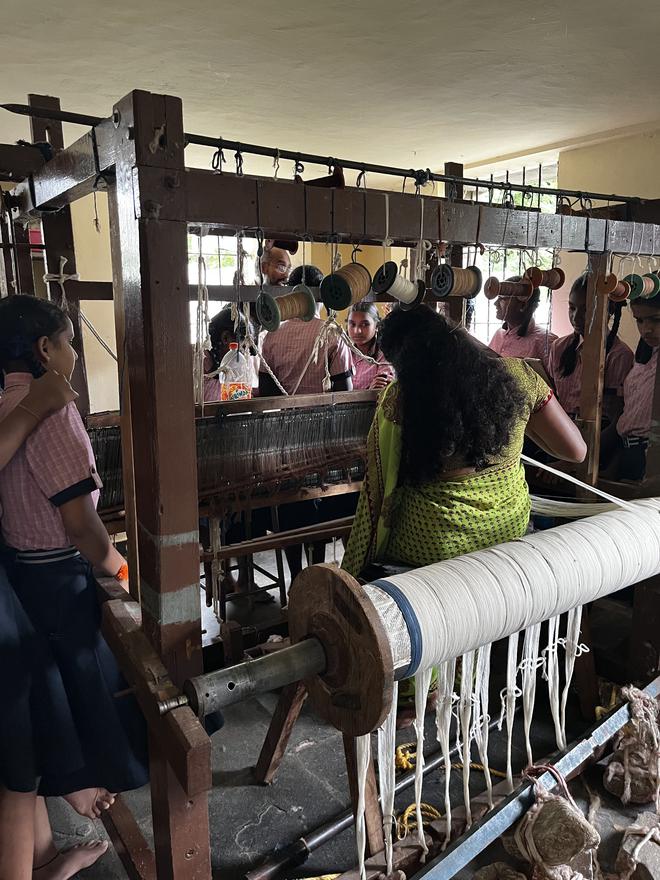The lush campus teems with women and children. On the walls are an assortment of pictures: the late Kannada actor Rajkumar, the writer Kuvempu and drawings by children. On the blackboards are jottings on Chandrayaan-3, English grammar, and biology. This is Shakthidhama school in Mysuru, but it is one with a difference — it carries forth an ancient tradition.
ALSO READ Threads of change: relevance of Gandhi’s charakha today
A bell rings announcing the end of the school day. Twenty-five children, all 14 years old, make a beeline for the charkha room: a dedicated space where students sit on a carpet and spin. This is a new ritual. In four months, the children have spun 650 metres of yarn to produce khadi. This project was the brainchild of K.J. Sachidananda, an artist based out of Mysuru. After buying a charkha of his own, he has travelled across the country, spinning, and recounting tales of Gandhi.
To Gandhi, the charkha symbolised self-reliance and freedom. He once wrote: “The message of the spinning wheel is much wider than its circumference. Its message is one of simplicity, service of mankind, living so as not to hurt others, creating an indissoluble bond between the rich and the poor, capital and labour, the prince and the peasant.”
Not a noun, but a verb
Sachidananda organises spinning workshops in the city and elsewhere, in the hope of inspiring people. “Gandhi is not a noun, he is a verb, and he lives in every one of us. We just need to find him within and bring him out. That’s what I did with the children at the school,” he says.
Shakthidhama, a rehabilitation centre, is supported by Rajkumar’s family. It provides shelter to rape victims, destitutes, those rescued from prostitution, human trafficking and domestic violence. The centre also helps with educating children from different backgrounds, including economically weaker sections, and children with single parents. After the demise of Rajkumar, his wife, and his son Puneeth Rajkumar, the onus of running the centre has fallen on the shoulders of his eldest son, actor Shiva Rajkumar, and his wife Geetha.

Rajeshwari, the social science teacher at the centre, leads the charkha project. She believes spinning is a masterclass in history. “Students only learn about Gandhi through textbooks; but by spinning — using the tool that was so dear to him — we are making sure his legacy lives on.”
Siddamma, a Class IX student, is busy spinning in the room. Her eyes are fixed on the yarn. She looks up with twinkling eyes, smiles and tells me: “We had no idea about the actual use of charkha. We had only read about it, but when we got to work on it, it felt magical.”
Other children share their experiences: “It increased my concentration,” says one. “It increased my patience, and reduced my anger,” says another. “I have started doing better at school,” says a third. Ashwini, a student, felt ‘empowered’. “I realised we could make our own clothes. We could provide employment to women, weavers, and tailors. If all of us in India learned how to spin, we would never have to depend on big corporations again.”
The students involved in the project were taken to Melkote, which has a noted khadi weaving centre, for a day-long workshop. “Talking to the weavers, we realised how we can support them through this project,” says Jhulekha, another student.
Helping weavers
Santosh Koulagi, who runs the Janapada Seva Trust in Melkote, an NGO that follows the ideals of Gandhi, believes the weaving community must be supported. “If you want to support sustainability, you should spin. The children from Shakthidhama brought 18 kg of yarn to us. It’s helping the weavers a lot.”

Although they have not yet developed a viable economic model, Sachidananda shares that they are looking at options. “We are confident about sustaining this long-term. We have already bought 100 kg of cotton, which will be enough for the next six months,” he says. And if the yarn can be sold outside, he believes it could support the children’s higher education. “We are also banking on Shiva Rajkumar’s celebrity status [to identify buyers]. He has invested in 25 charkhas and is now planning to extend this programme to classes VII and VIII.”
The traditional spinning wheel has been the cornerstone of rural Indian life for centuries. “As I delved into the art of spinning, I discovered an immense joy and satisfaction in creating something beautiful and useful from scratch,” says Sachidananda. “This self-reliance brought with it a sense of empowerment and connection to an ancient and traditional skill.”
Khadi meets AI
‘Swaraj’, a textile and art exhibition — an ode to Gandhi — will be held at the National Crafts Museum and Hastkala Academy, Delhi, between October 3 and 6. Hosted by Pearl Academy, the exhibition is the product of a partnership between Indian artisans and Italian artists. ‘Swaraj’ fuses traditional craftsmanship with artificial intelligence in a unique tribute to Gandhi’s legacy.
Through this pilot project, he hopes to reach the entire country. He believes if school children are taught how to spin, the craft will not die. “By supporting spinning, we not only teach our children the craft, we also support weavers, carpenters, tailors and garment workers. That is the embodiment of self-reliance.”
Madhav Sahasrabudhe, a retired mechanical engineer from Pune, echoes Sachidananda’s views. An avid spinner, he travels across India to teach people the art of spinning. “If the government introduces a model where they buy the yarn spun by students, then they can make this exercise economically sustainable.”
sindhu.nagaraj@thehindu.co.in







